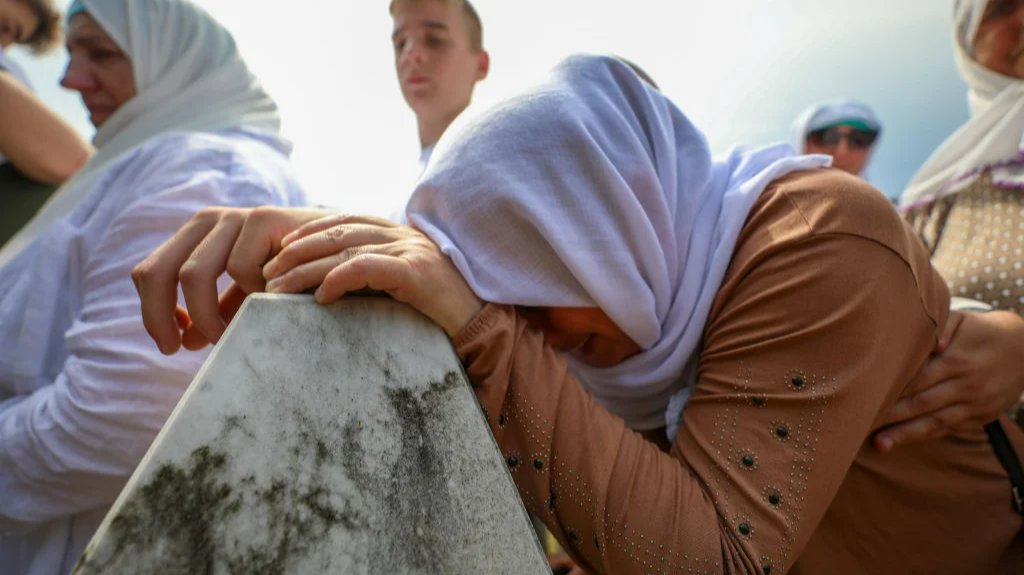Life brought us together with Alma Mustafich, one might say, by accident, one might say, by chance. On 10 February, just 13 days before the war, I went to Russia’s Perm region to visit Nikolai Mitkin, the “child of the Gulag”, who was allowed to return home only 30 years after the collapse of the USSR. His interests were represented by lawyer Grigory Vaypan. Before that, I was not acquainted with either Nikolai or Grigory.
In June, when the war was already raging, Grigory called me and said that he met Alma, who survived the terrible events in Bosnia in 1992-1995, at an online forum. And briefly recounted her story.
Since then, Alma and I have spoken several times. Her memories of a girl who survived the massacre in Srebrenica, and her vision of the events of the present day, are both a testament to the era and a reminder of the unlearned lessons of history.
***
We lived in Srebrenica. My father Rizo Mustafić was from the small village of Osat, my mother Mehida Mujiić came from Bratunac.
Dad had a master’s degree in electrical engineering and worked as a project manager at a large factory, and my Mum was a design engineer. Srebrenica was growing and everyone was very busy.
Our parents were building a new house. It was almost finished.
We lived in the beautiful area of Vidikovac, and many of our nieces and nephews lived next to us. We liked it, because we always had fun playing together. Life was very good!
My brother and I were born in Srebrenica and have lived there all our lives. When the war started, I was in the 4th grade and my brother was in the 6th. I met the beginning of the war as an eleven-year-old girl, and at the time of the massacre in Srebrenica, I was 14.
‘To show us that we do not exist as a nation’
“Before the war, I didn’t even know that there was any difference between the Serbs and the Bosnians. In Srebrenica, we all lived together. We did everything together: celebrated holidays, birthdays. I never thought about why we celebrate Christmas with our Serbian friends, and Eid al-Adha at home. We never talked about these differences. All of my father's best friends were Serbs.
Later, I realised that things were different in the villages. The villages were nationally homogeneous: either Serbian or Bosnian. Sometimes, they were separated only by a road, but still, there were few mixed villages. The cities were mixed, and no one there thought about ethnic differences. We were interested in the latest gadgets, trends and fashion…
I was forced to find out what the differences between us were when the shooting started.
It is impossible to talk about the massacre in Srebrenica in 1995 without looking back at the events of 1992, 1993 and 1994 — the first years of the war. I think talking about this period is inevitable if we want to understand what happened.
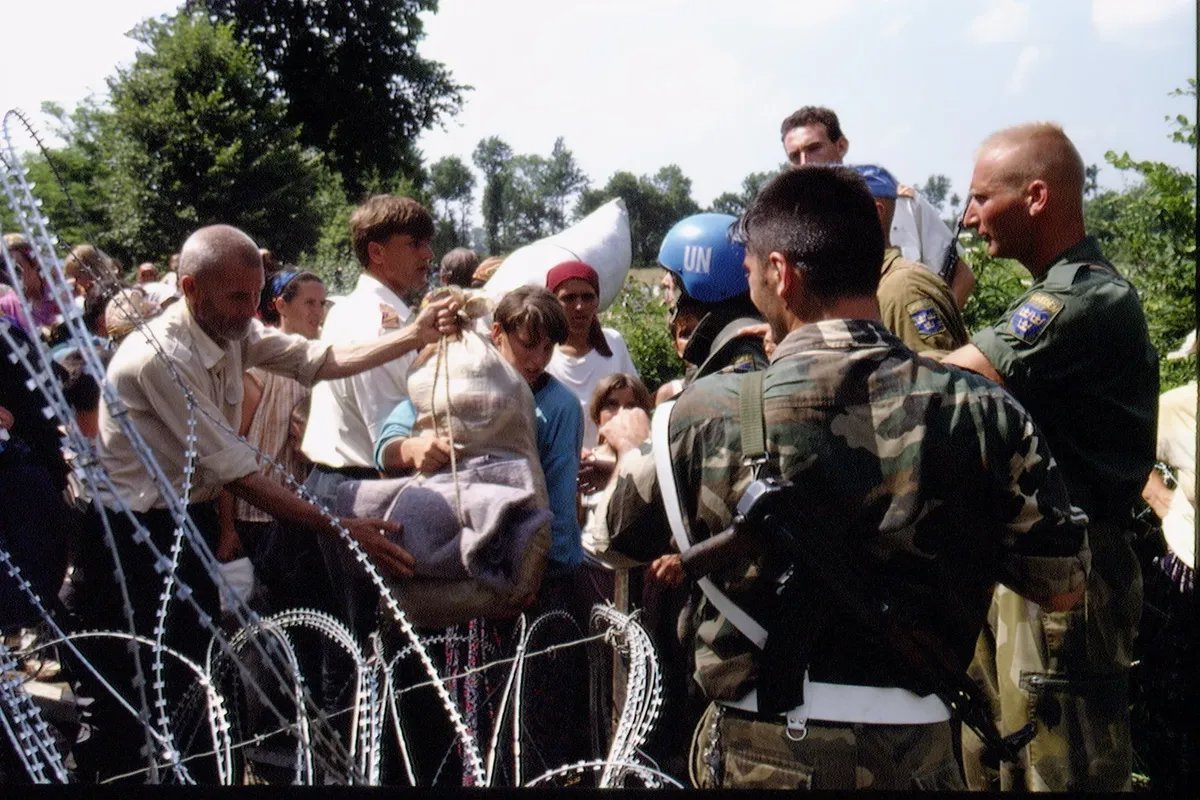
Srebrenica refugees at the Tuzla camp, July 1995. Photo: Patrick Robert / Sygma / CORBIS / Sygma / Getty Images
I remember how at the beginning of the aggression, in April 1992, Srebrenica became deserted. This happened in just a few days. The Serbian population left the city and went to Serbia. We didn’t understand why… Although at that time, I didn’t know the difference between nations and names yet, I remember how our Serbian friends came to visit us. This visit made a big impression on me, because it was the first time they did not bring their children to play with us.
I sat in the corner of the room, listening to the conversations of adults. They cried all night and only repeated that they knew nothing. Family friends suggested that my father take me and my brother to Serbia. The father replied: “Tomo, if there is a war here, tell me honestly so that I can save my children.” Tomo just shrugged.
A few days after that visit, we went to the neighbouring village of Osat to visit my grandparents. For us children, it was like a vacation. However, this time, we were not allowed to swim in Lake Perućac. The lake (in fact, an artificially created reservoir on the Drina River) served as the border with Serbia. A couple of days later, the tanks of the Yugoslav People’s Army (JNA) stood on the other side of the Drina, across the lake, on Mount Tara. And since then, even us children had become targets for them when we played in the street.
The shelling made us grow up in an instant. We spent whole days in the basement. And in those long dark hours during the bombing, I first learned who is a “Serb” and who is a “Muslim, Bosniak”. When the situation in the village became unbearable (we were bombed every day), we decided to return to Srebrenica.
It looked like a picture from World War II: houses burned down, shops and factories looted. According to some reports, only 300–400 inhabitants remained in the city.
Those who remained told us what happened here. They said our Serb neighbours had participated in the killings of Bosnians. We did not understand how this could happen: yesterday, these people drank coffee with us, and today, they are killing us?
However, not all stories were bad. For example, we were told about a Serb who developed a system to warn Bosnians of danger. The Bosnians hid from the Serbian military in the forest, and only occasionally sneaked back to their homes to grab some food. So, this man wore green pants when it was safe for the Bosnians to return to Srebrenica. And if he put on red pants, they had to stay in the forest. My father’s friends also helped him on several occasions when he was captured by Serbian paramilitaries, but helping Muslims was risky. The Serbs who helped us could expect the same fate as us.
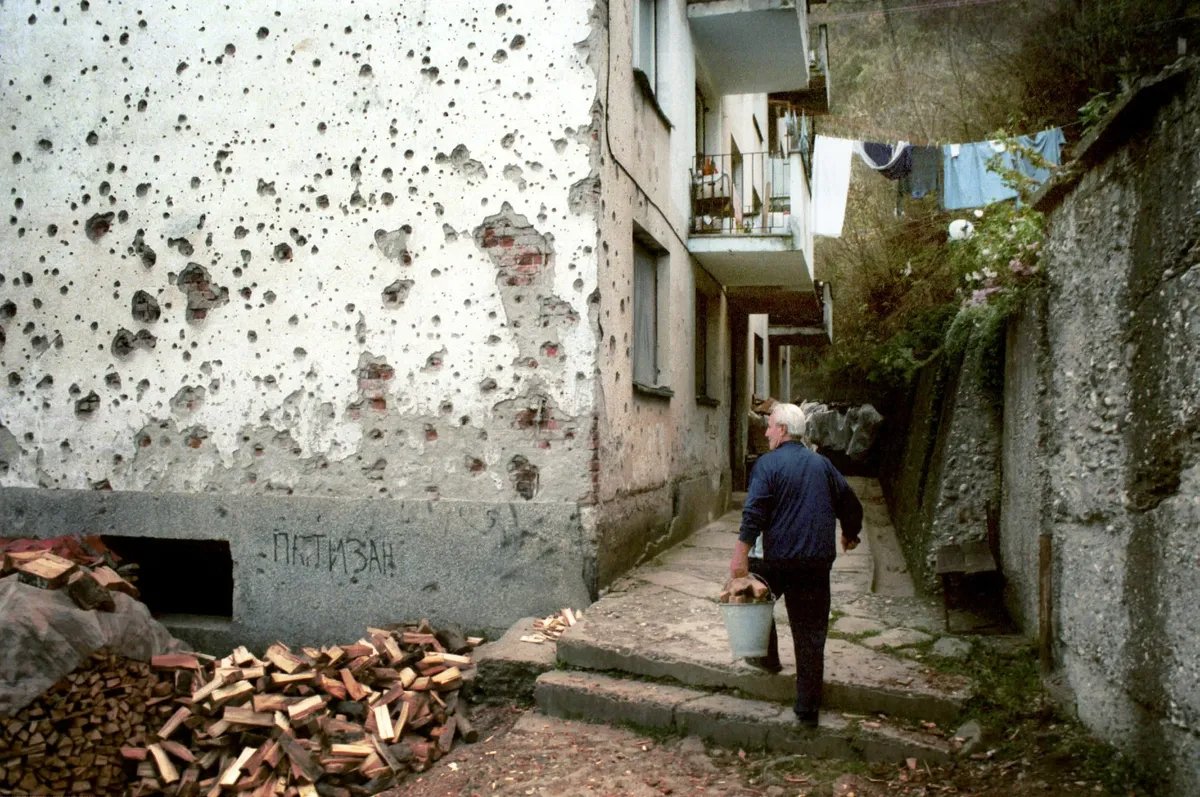
The aftermath of the shelling in Srebrenica. Photo: Kael Alford / Newsmakers
While the shelling took lives every day, the city was going through its own struggle for survival. There was no food, medicine, or basic necessities. People died from hunger, disease, and the cold. Srebrenica became the largest open-air concentration camp.
However, it was one of the last cities not under Serb occupation. And every day, hundreds of refugees came here. Strangers knocked on doors, looking for shelter. At one time, more than 40 people lived in our house.
In total, about 50,000 refugees came to Srebrenica from all over eastern and central Bosnia. I remember the testimonies of survivors of the camps in Bratunac, Vlasenica and Vysehrad. They told horror stories, but to me, a little girl, the rape stories were the worst. We all hoped that Srebrenica would not fall and that we would not suffer the same fate as these people.
With the arrival of UN peacekeepers in April 1993, the situation somewhat stabilised. The shelling of the city stopped, refugee camps were created so that people would not live on the streets, and sometimes humanitarian aid was provided. But by the summer of 1995, the Serbian army, together with volunteers and paramilitaries from Russia and Greece, nevertheless decided to attack our city.
What happened to us happened all over eastern Bosnia in 1992 and 1993: the ethnic cleansing of the Bosnian population. The Serbs never called us correctly: Bosnians or Bosniaks. They deliberately called us “Muslims” to deprive us of our Bosnian identity. To show us that we do not exist as a nation. That we as a country do not exist. In their eyes, we were Serbs, but we were “lost”, and they had to “remind” us “who we were 600 years ago”! This is the philosophy that Vladimir Putin is now professing, refusing to recognise Ukraine as a country and Ukrainians as a nation.
In his eyes, they are “lost Russians”, only “they don’t know it themselves” and he “had to help them remember who they really are.”
The attack on Srebrenica was genocide. We could not expect anything else, because we knew what happened in Bratunac, Vlasenica, Zvornik, Bijeljna, Višegrad, Foča (by the summer of 1995, as a result of three dozen cases of massacres, including the mass killings of civilians in Višegrad, Prijedor and Foča, at least 12,661 people were killed — Ivan Zhilin). Within three-and-a-half years, eastern Bosnia was almost completely “cleansed” of Bosniaks through murders and deportations… But Srebrenica turned into an enclave where many Bosnian refugees arrived, and this enclave had to be eliminated, as it stood in the way of creating a “Greater Serbia” where only ethnic Serbs live.
Nightmare days
Srebrenica was declared a UN security zone. Citizens living on its territory were to be protected. First, the Canadian Blue Helmets approached Srebrenica, but they were soon replaced by the Dutch battalions. The first, the second, the third. Each mission remained in Srebrenica for 6 months. They disarmed the Bosnian men and said they would protect us if the Serbs attacked. My father was able to get a job at their base, and even though working as an electrician was below the level of his education, he did this job with love, because in this way, he could earn some money and buy us food.
The situation stabilised for some time. We were no longer bombed and we were not starving. But it was only a matter of time.
We often laughed at the Dutch peacekeepers. They came to Srebrenica wearing Ray-Ban sunglasses and shorts. They were very young and beautiful. They looked like they were on vacation, not in a war zone. We soon realised that they could not or would not offer real resistance if the Serbs attacked. We just hoped that their mere presence would be enough to intimidate them.
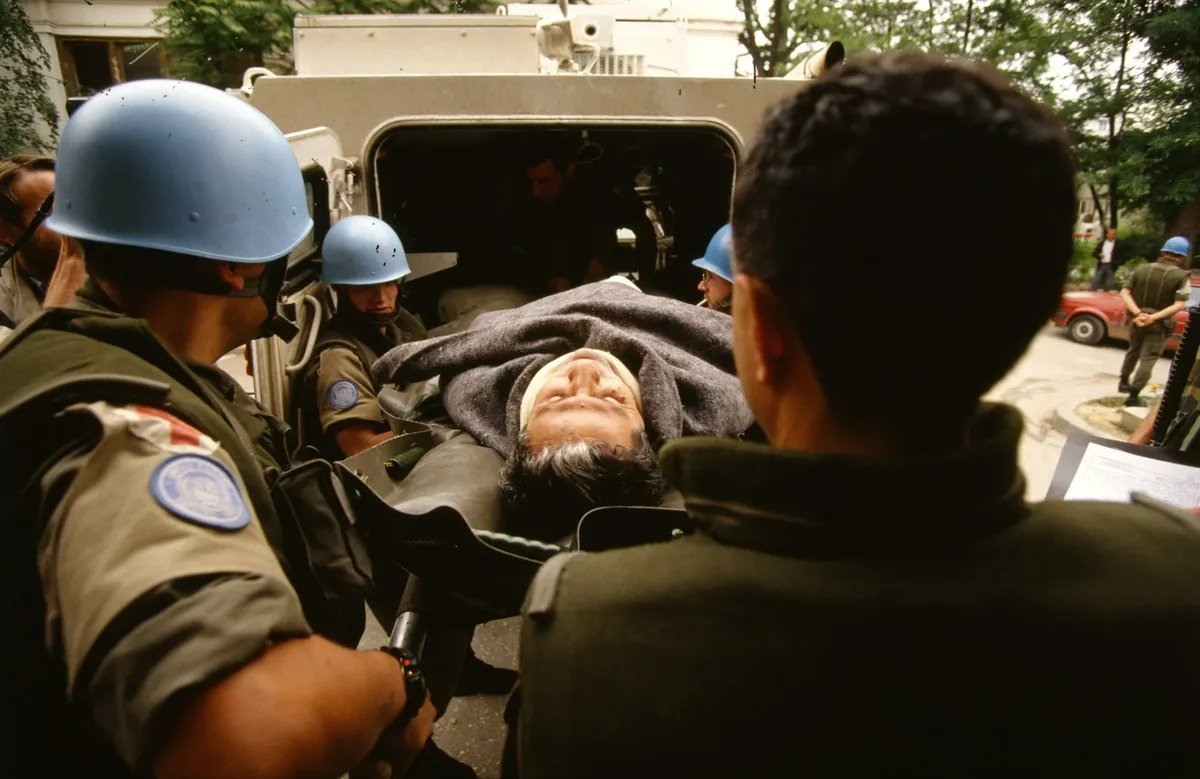
UN peacekeepers in Sarajevo, 1992. Photo: Jon Jones / Sygma / Sygma / Getty Images
We had a good relationship with the peacekeepers thanks to my father’s work. At first he was even allowed to take his lunch home so we could eat too.The “Blue Helmets” often visited us. But over time, the rules became more and more strict, and the soldiers of the third Dutch battalion were no longer allowed to have any contact with us. My father was no longer allowed to take lunch home, and the peacekeepers came to us only in secret.
When the attack on Srebrenica began on 11 July 1995, we sought protection at the UN base. Inside the base, we were given a warehouse and my father’s office, where we spent the next two nights. About 5,000 refugees were admitted to the base. However, more than 20,000 were not allowed in. They stayed outside the base, and terrible things were happening there. But we were sure that we were safe inside the base.
Two days later, the Dutch ordered these five thousand refugees to leave the base, too. Even my father, who was on the list of the Dutch battalion personnel.
Immediately after leaving the base, we were separated: the Serbs took my father away, and we were pushed into buses. Mum begged to let Dad go with us, but to no avail.
They pushed us even harder. We met Momir Nikolić, a Serbian commander, a former classmate of my mother and a good friend of my father. He asked my mother: “Where is Rizo?” Mom said: “Your men have him.” Mum begged him to save my dad, and he said: “Don't worry.”
In fact, Momir simply sent my dad to where all the men were killed. We only found out about it years later. We also met a UN peacekeeper, my father’s colleague Monique Bergman, and we asked her for help. To no avail.
It is important to note that the Dutch battalion knew that people were being killed outside the base. But they still decided to expel the refugees from the grounds. Later, when I sued the Dutch state, arguing that it was responsible for the deaths of the Bosnians in Srebrenica, the peacekeepers would often deny this.
The road from Srebrenica was terrible: regular stops, attacks by refugees, boys and girls taken away from their parents, money and jewellery stolen from us… I remember that one time I raised my head to see what was happening outside and saw a bunch of dead people… Mom pushed my head down, and I didn’t get up again. I hugged the baby of the gypsy woman sitting across from me. I tried to comfort her because she was very scared and kept saying, “They will kill us all.” When we reached our destination and we had to get off the bus, we thought that they would kill us too.
Once again, the Serbs began to separate men, women, boys, and girls in different directions. My mother held my two-year-old sister in her arms and told me and my brother: “Hold me tight, look at the ground, and if they want to separate us, we won’t let each other go anymore. If we die, we die together.” It is difficult to describe the fear of not being allowed to run or fall behind because you are afraid that this will give them an excuse to separate you from your family. The Serbs let us through but separated some other families.
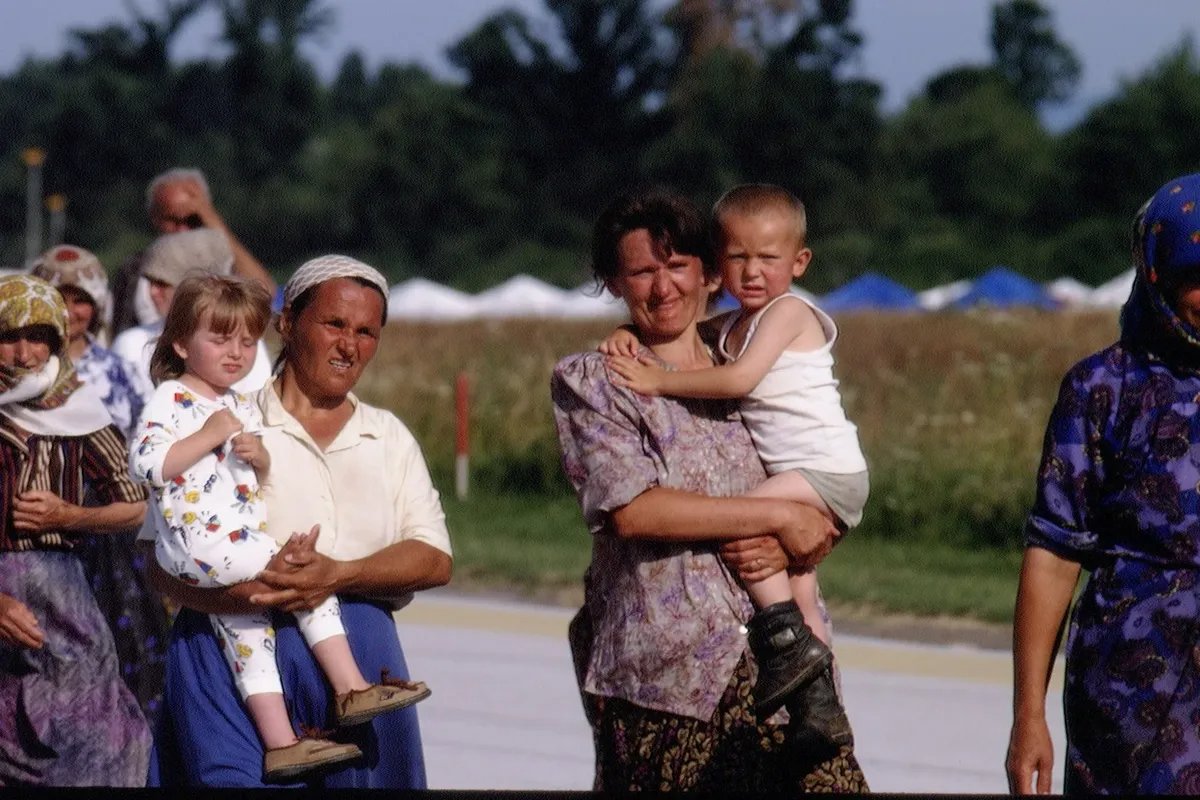
Refugees from Srebrenitsa in the Tuzla camp, July 1995. Photo: Patrick Robert / Sygma / CORBIS / Sygma / Getty Images
There were only two lists at the UN peacekeeper base. One listed the personnel who would be evacuated with the Dutch battalion, and the second was a list of Bosnian men who were on its territory. It contained the names of 239 people. The names of the men who were on the territory were marked in the hope that this would be sufficient for protection when they were handed over to the Serb forces. In turn, the personnel were to be evacuated along with the Dutch battalion. However, in the case of my father, they made a “mistake” and sent him off the base with those 239 men and boys. When my father left the territory of the Dutch camp, several soldiers of the Dutch battalion came to us and said: “You must go too. Almost everyone has left, all the refugees must leave, and so should you.” And they escorted us to the exit to make sure we actually left the base. Not that they were happy about it, you can say that it was an order from above. And then they watched as my father was separated from us… According to them, it was a misunderstanding. But in fact, there was complete chaos in Srebrenica, and the Dutch were only trying to escape. They didn’t care about the lives they could save. Some of them really tried their best, but it wasn’t enough. It was not up to the ordinary soldiers, it was up to the leadership of the Dutch battalion.
Russia and Ukraine
Bosnians feel connected to Ukraine because the same ideology that was used to kill us is now destroying this country. I have been following Ukrainian events since 2014, as have many of my friends. From the beginning of February, we understood that there would be a war, and we were counting down the days. It was obvious to us that the war would start, we were only unsure of the date.
Everything that Russia did was similar to the actions of the Milošević regime in the 90s. The soldiers were prepared for the invasion, but they masked the preparations as measures to “protect” their people. They built an army on the eastern border of Ukraine. Then there were long queues at the banks, long queues at the gas stations, Putin’s language — the language of war… The evacuation of “our own”. When I saw Donbas orphans appearing in front of the camera, who needed to be “saved”, I knew for sure: soon, this area would turn into a battlefield, there should be enough emotional sentiments in Russia to justify the invasion. The evacuation of so many people is a serious and costly operation. You won’t be taking that many people out of a region unless you’re going to turn it into a battlefield.
The motivation of the Serbs in the 90s was the same as that of Russia now: to expand the territory, to create a “Greater Serbia”. A homogeneous country.
“If we unite all Serbs on one land, only then can we protect ourselves and be safe.” To create this “Greater Serbia”, you need to eliminate the “others” — that very “danger”, but first you have to make your people believe that they are in danger… To do this, they need to be convinced that they are the best, that they are the “real victims”, that their empire is being taken away, and that they must “defend” themselves and “their people” in a different place. You must dehumanise “the others” in order to make them disappear.
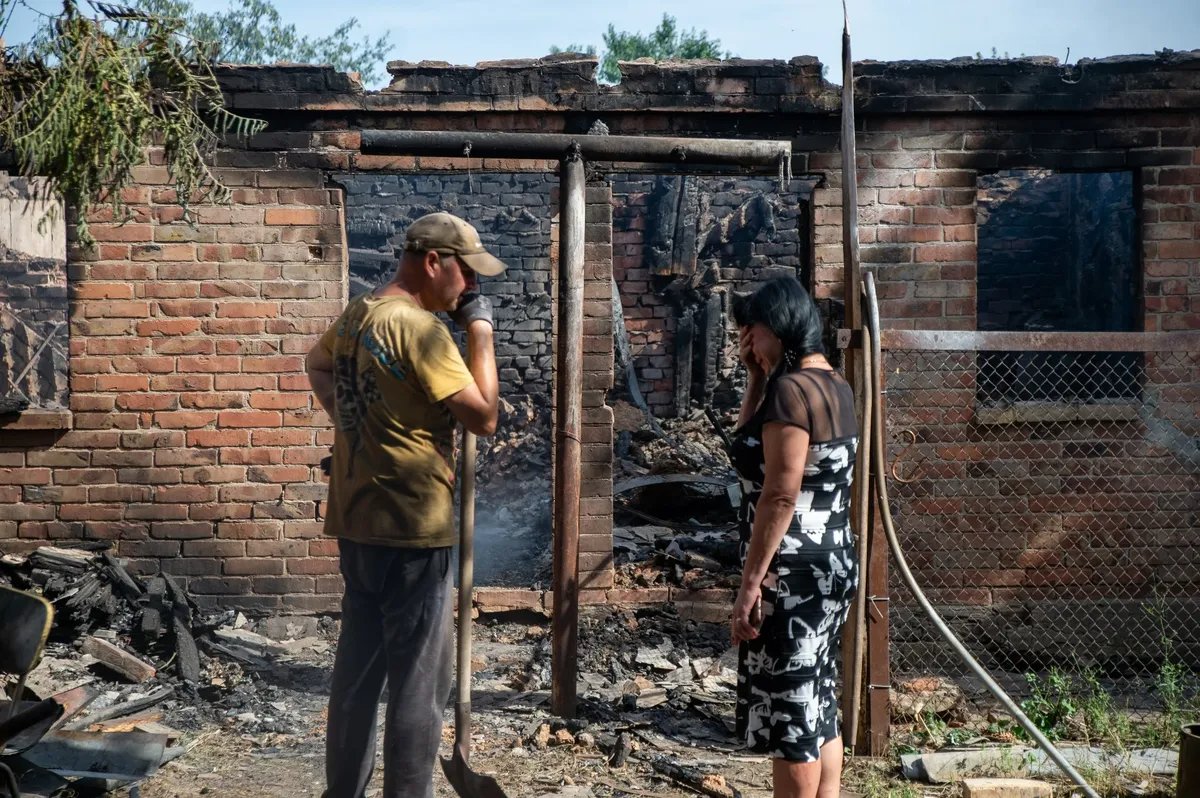
Residents of Ukraine’s Bakhmut in front of the ruins of their house, August 2022. Photo: Madeleine Kelly / SOPA Images / LightRocket / Getty Images
Since the 1980s, books were written in Serbia that nurtured nationalist feelings: everything Serbian was glorified, and everything “Turkish” was bad. And we were the “Turks”! This dehumanisation requires the efforts of all public institutions, and not just politicians: the efforts of the media, art workers, culture, education, and science are needed. And, of course, the church. The church plays a major role in this. Why? Because the church stands for morality: if the church approves of something, then who are we, the ordinary people, to disapprove?
Unfortunately, the relations between Bosnia and Serbia are still bad to this day. This is because the political ideology that led to the genocide was never condemned by the Serbian government. This ideology is still alive not only in Serbia, but also in the ethnic Republika Srpska (a part of Bosnia that arose as a result of the genocide). The genocide is still denied. Until there are new generations of politicians who are ready to publicly renounce the nightmarish politics of the 90s, the relations will not improve.
Serbia does not say that there were no killings in Bosnia. Its leaders say: “What happened is terrible, but you also committed crimes.” It's true, there were crimes on both sides. But there is a huge difference between crime and genocide. Please don’t get me wrong: I believe that every crime should be punished. But there are studies showing that 90% of all crimes in Bosnia were committed by the Serbs, 10% by the Bosnian and Croatian army.
Most Bosnians sympathise with the Ukrainians. We ourselves experienced an aggressive war and therefore we sympathise with the Ukrainian people.
Let me make it clear: people really do see the difference between the military and political leadership of Russia and the Russian people. But silence is unacceptable when people’s lives are at stake. The Russian people must stand up and speak out against this aggression.
The only way to avoid future wars is to stop treating oppressors as equal partners in the international community. We need to break off any contact with them and speak to those who are oppressed. Ask them what they need and how we can help them. And show solidarity with them. And if this means, as in the case of Ukraine, that we will have cold winters for several years due to lack of gas, then so be it. But we in the West think that the price we pay for the war in Ukraine is too high because of our gas bills.
Well, the price Ukrainians pay is the highest. They are being killed.
We should not be afraid to intervene. I think Europe needs to do more to stop this war as soon as possible.
And there’s one thing I know for sure: a country that resists and defends itself cannot be conquered. Ukraine will win no matter what, although now I know that this war will last for many years.
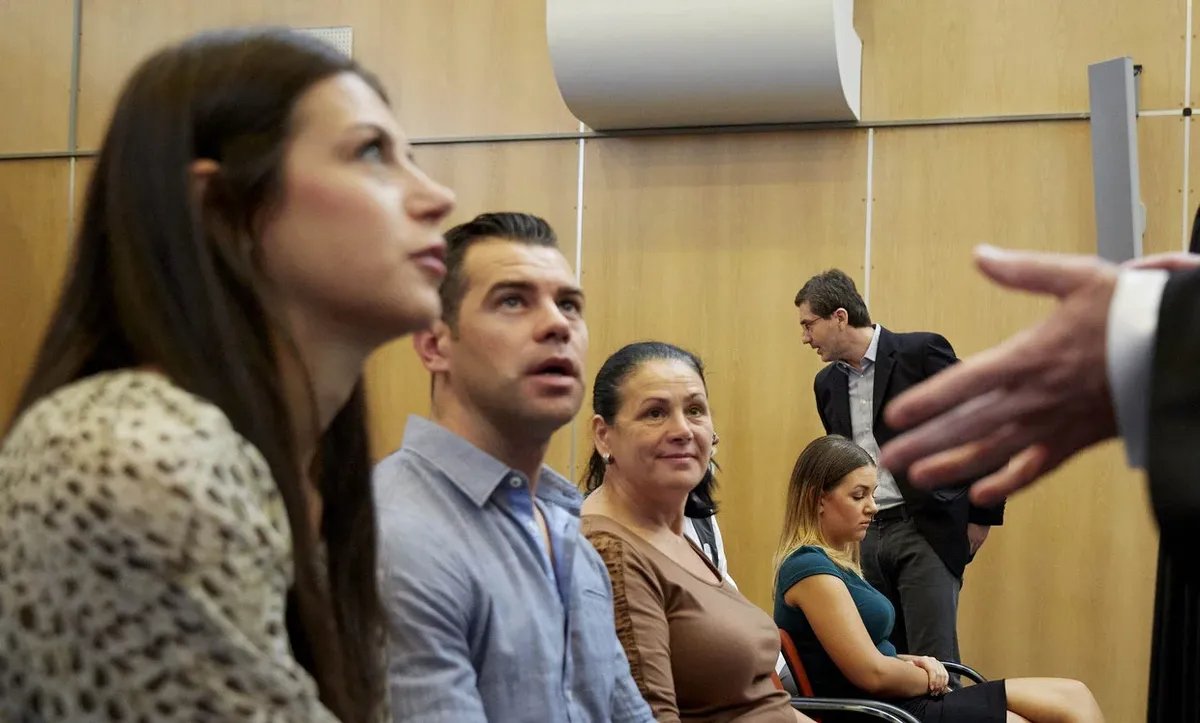
Alma Mustafić, her brother and mother in a Dutch court. Photo from personal archive
Instead of P.S.
In September 2013, Alma Mustafić, her mother, her brother, and the translator of the Dutch peacekeeping battalion, Hasan Nuhanović, were able to prove that the Netherlands was responsible for the death of their relatives in Srebrenica. The Dutch Supreme Court found that the Dutch, when expelling refugees from the base of the peacekeeping troops, already knew that men were being killed outside the complex.
“The case was extremely difficult. Facts and our experience were constantly questioned or denied. We even had to prove that my father worked for the Dutch battalion, because at first the Dutch ‘defenders’ claimed that they did not know my father at all. The worst thing was that they claimed that we left the territory voluntarily! They literally said, ‘You wanted to leave, we didn't force you to leave the complex.’ No: we were there and did not want to leave at all, but the soldiers of the Dutch battalion, armed, came in and told us: now you must go. And here we are in the Netherlands, and the Dutch lawyer tells us that at that time we left voluntarily…
It was extremely difficult to prove that we were right. We didn’t have access to all the documents. We tried everything, including appeals to the media. Once I was on a talk show with General Hans Cosey, who was in charge of the “safe zone” in Srebrenica, and I thought: “My only goal is to get him to say that we did not leave voluntarily.” And then it happened! I couldn’t believe it! I called my lawyer and said, “Watch this show.” I didn’t know if it would have any legal implications. But yes, it helped.
It took the four Bosniak survivors of the massacre 12 years to get the truth in court.
Join us in rebuilding Novaya Gazeta Europe
The Russian government has banned independent media. We were forced to leave our country in order to keep doing our job, telling our readers about what is going on Russia, Ukraine and Europe.
We will continue fighting against warfare and dictatorship. We believe that freedom of speech is the most efficient antidote against tyranny. Support us financially to help us fight for peace and freedom.
By clicking the Support button, you agree to the processing of your personal data.
To cancel a regular donation, please write to [email protected]
